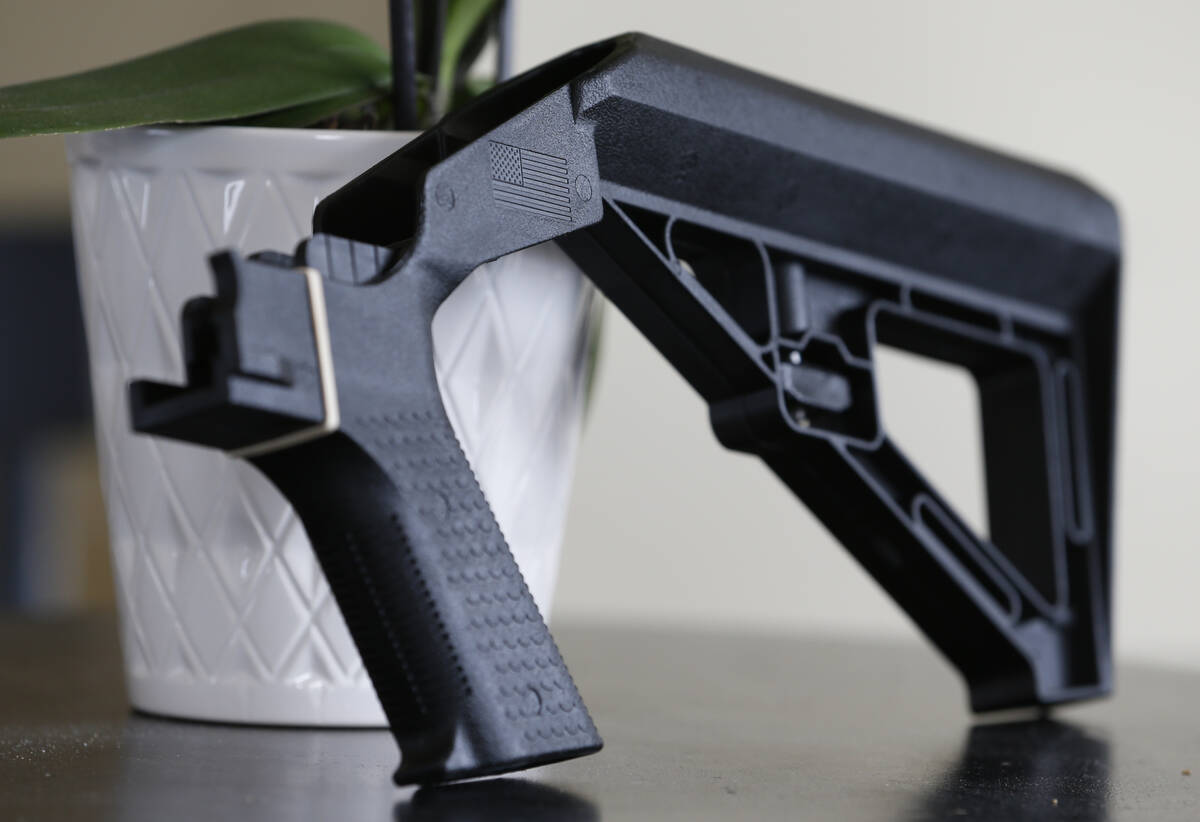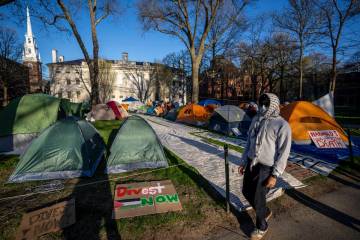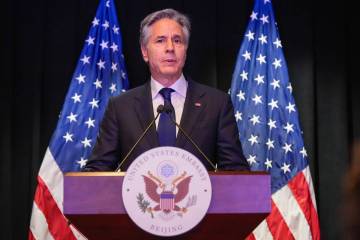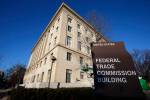Challenge to Trump-era ban on bump stocks heard in Supreme Court
WASHINGTON — The Supreme Court appeared torn Wednesday about a challenge to a Trump-era ban on bump stocks, a gun accessory that allows semi-automatic weapons to fire rapidly like machine guns and was used in the deadliest mass shooting in modern U.S. history.
The high court is weighing whether the Trump administration followed federal law when it reversed course and banned bump stocks after a gunman in Las Vegas attacked a country music festival with assault-style rifles in 2017. Many of the weapons were equipped with bump stocks and high-capacity magazines. More than 1,000 rounds were fired into the crowd in 11 minutes, killing 60 people and injuring hundreds more.
The arguments largely focused on whether guns with a bump stock can be considered illegal machine guns under federal law. A Texas gun shop owner argues that bump stocks don’t change the core function of a semi-automatic weapon enough to make it illegal. The Biden administration says bump stocks fall firmly under the legal definition of machine gun.
It is the latest gun case to come before the justices and offers a fresh test for a court with a conservative supermajority to define the limits of gun restrictions in an era where mass shootings are exceedingly prevalent.
Conservative justices raised questions about whether machine-gun laws dating to the 1930s apply to bump stocks and about the Justice Department’s previous finding that the accessories were legal.
“Intuitively, I am entirely sympathetic to your argument,” said Justice Amy Coney Barrett, “I think the question is, why didn’t Congress pass that legislation to make this cover it more clearly?”
Justices from the court’s liberal wing suggested it was “common sense” that bump stocks would fall under laws originally aimed at Prohibition-era violence from gangsters such as Al Capone. “This is in the heartland of what they were concerned about, which is anything that takes just a little human action to produce more than one shot,” Justice Elena Kagan said.
Federal appeals courts have been divided over bump stocks. The case before the court differs from other gun cases — including a landmark 2022 decision in which the six-justice conservative majority expanded gun rights — because it’s not directly about the Second Amendment.
Instead, the plaintiffs argue that the Bureau of Alcohol, Tobacco, Firearms and Explosives overstepped its authority in imposing the ban. The agency had previously decided bump stocks should not be classified as machine guns and therefore not be banned.
That changed after Las Vegas.
Marisa Marano, 42, survived the shooting at the show she attended with her sister, but struggles with the lasting effects on her life and and community. “I will never forget the sound of a machine gun firing into the crowd that night as Gina and I ran for our lives,” said Marano, who is now a volunteer for the group Moms Demand Action and hopes the Supreme Court upholds the ban.
Bump stocks are accessories that replace a rifle’s stock, the part that rests against the shoulder. They harness the gun’s recoil energy so that the trigger bumps against the shooter’s stationary finger, allowing the gun to fire rapidly.
They were invented in the early 2000s. Under Republican President George W. Bush and Democrat Barack Obama, the ATF decided that bump stocks didn’t transform semi-automatic weapons into machine guns. The agency reversed that decision at Trump’s urging after the shooting in Las Vegas and another mass shooting at a Parkland, Florida high school that left 17 dead.
The plaintiffs argue that rifles with bump stocks are different from machine guns because the trigger keeps moving and the shooter must continue to exert pressure on the weapon.
“It’s still one shot per function of the trigger, even though the shots are coming out of the barrel a lot faster than they were before,” said attorney Jonathan F. Mitchell, who argued on behalf of Texas gun shop owner and Army veteran Michael Cargill.
Government lawyers pointed out that traditional machine guns also require pressure from the shooter. They argued bump stocks fall under the legal definition of machine guns because the shooter’s finger stays still while the gun fires hundreds of rounds per minute.
Brian Fletcher, principal deputy solicitor general, said that the ATF’s previous findings were less in-depth than the review it undertook under Trump.
“After the Las Vegas shooting, the deadliest shooting in our nation’s history, I think it would have been irresponsible for the ATF not to take another look at this prior interpretation,” he said.
There were about 520,000 bump stocks in circulation when the ban went into effect in 2019, requiring people to either surrender or destroy them, at a combined estimated loss of $100 million, the plaintiffs said in court documents.
Justice Neil Gorsuch questioned the Justice Department about the effects of the about-face on the millions of people who bought bump stocks while they were legal. Fletcher responded that the Justice Department doesn’t intend to prosecute people who turned in their bump stocks under the new rule, though he later indicated that people who bought them after the rule was finalized could potentially face prosecution.
The high court took up the case after the New Orleans-based 5th Circuit Court of Appeals invalidated the ban, a finding that differed from a ruling from the federal appeals court in Washington to uphold it. Fifteen states and Washington have their own bans on bump stocks.
The high court is separately weighing another gun case this term challenging a federal law intended to keep guns away from people under domestic violence restraining orders. The justices appeared likely to keep that measure in place during arguments in November.
The bump stock challenge comes at a time when the 6-3 conservative majority has been increasingly skeptical of the powers of federal agencies. This term, the justices also are weighing challenges to aspects of the Consumer Financial Protection Bureau and the Securities and Exchange Commission.
A decision is expected by early summer.




























